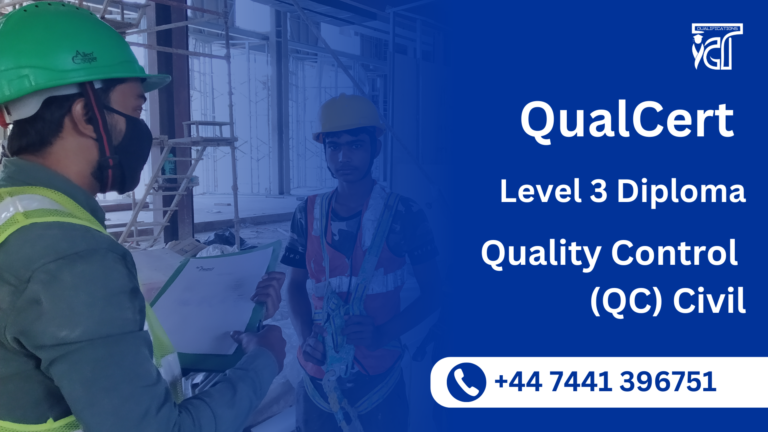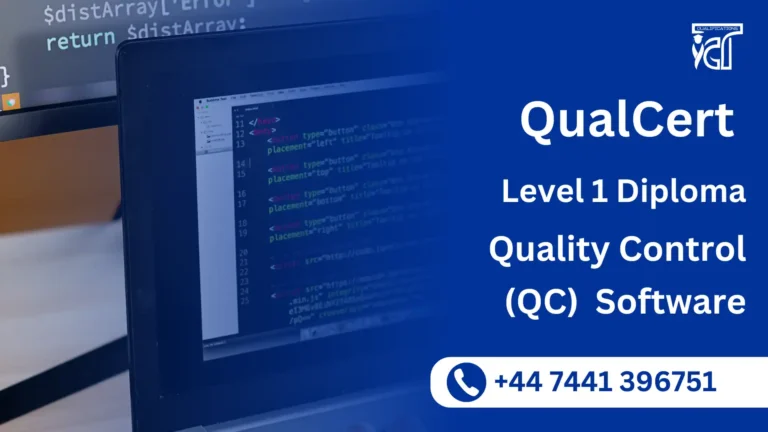As industries and cities continue to evolve, the demand for qualified professionals who specialize in utility mapping and surveying has never been greater. The ProQual Level 6 Diploma in Utility Mapping and Surveying is an Ofqual-regulated qualification designed to equip professionals with the advanced knowledge and practical skills required to manage and map utility infrastructure effectively. Whether you’re an experienced surveyor looking to advance your career or someone transitioning into the field, this qualification provides the expertise to thrive in the growing utility and infrastructure sectors.
The ProQual Level 6 Diploma in Utility Mapping and Surveying is an advanced, Ofqual-regulated qualification that aims to provide in-depth knowledge and practical expertise in the utility surveying field. Utility mapping and surveying involve identifying, documenting, and mapping the location and condition of underground utilities such as gas, water, electricity, and telecommunications networks. This qualification is designed for professionals working in fields such as civil engineering, construction, and utility management, offering them the tools to ensure accurate data collection, analysis, and reporting for safe and efficient infrastructure development.
Unlike traditional exam-based qualifications, the ProQual Level 6 Diploma is entirely assignment-based, which allows learners to demonstrate their practical understanding and problem-solving abilities through real-world case studies and scenarios. The assignment-based assessment model encourages deeper learning and ensures candidates are fully prepared to tackle industry challenges with confidence.
The ProQual Level 6 Diploma is assessed entirely through assignments. These assignments are designed to assess your ability to apply theoretical knowledge to practical situations, making the qualification ideal for professionals who wish to gain hands-on experience and improve their problem-solving skills. The assignments cover a range of topics, including the use of advanced surveying equipment, data collection and analysis, and the legal and safety aspects of utility surveying.
The ProQual Level 6 Diploma in Utility Mapping and Surveying is an excellent opportunity for professionals looking to advance their careers in utility and infrastructure sectors. As an Ofqual-regulated qualification, it offers industry-recognized credentials, a comprehensive curriculum, and practical, assignment-based assessments that align with real-world job requirements.
ProQual Level 6 Diploma in Utility Mapping and Surveying
The ProQual Level 6 Diploma in Utility Mapping and Surveying, achieve the qualification candidates must achieve all of the mandatory units:
| Sr# | Unit Title | Level |
|---|---|---|
| 1 | Agree project requirements and plan site surveying in geomatics and site surveying management | 6 |
| 2 | Manage the analyses and presentation of site surveying information in geomatics and site surveying management | 5 |
| 3 | Identify, assess and present spatial data in geomatics and site surveying management | 6 |
| 4 | Vacuum excavations | 4 |
| 6 | Identify hazards and control risks in geomatics and site surveying management | 5 |
GLH (Guided Learning Hours) and TQT (Total Qualification Time) are terms commonly used in vocational qualifications to help define the amount of time a learner is expected to spend on their studies.
1. GLH (Guided Learning Hours)
GLH refers to the number of hours a learner spends being directly taught, supervised, or supported during their course. This includes the time spent in activities such as:
- Classroom instruction
- Practical workshops
- One-on-one tutoring or mentoring sessions
- Online learning sessions with tutor support
In other words, GLH represents the time that learners are actively engaged with their instructors or learning activities.
2. TQT (Total Qualification Time)
TQT represents the total amount of time a learner is expected to invest in completing a qualification, including:
- GLH (Guided Learning Hours): Time spent on direct learning, as explained above.
- Self-Directed Learning: This includes time spent on independent study, research, assignment completion, preparation for exams, and any other work the learner does outside of direct teaching hours.
TQT is a broader measure that includes all the time required to achieve the qualification. It helps learners and employers understand the overall commitment required for the qualification.
Key Differences Between GLH and TQT:
- GLH focuses on direct learning with guidance or supervision.
- TQT includes GLH as well as independent study time and other learning-related activities.
Example:
If a qualification has a TQT of 600 hours and a GLH of 250 hours, it means the learner should spend 250 hours in direct learning (classroom, online, or tutor-led sessions) and 350 hours on independent study or research.
ProQual Level 6 Diploma in Utility Mapping and Surveying
Agree project requirements and plan site surveying in geomatics and site surveying management
- Be able to identify, assess and agree project requirements for site surveying
- Understand how to identify, assess and agree project requirements for site surveying
- Be able to plan site surveying processes and operations
- Understand how to plan site surveying processes and operations
Manage the analyses and presentation of site surveying information in geomatics and site surveying management
- Be able to manage the preparations for site surveying operations
- Understand how to manage the preparations for site surveying operations
- Be able to manage the observation and recording of site surveys
- Understand how to manage the observation and recording of site surveys
- Be able to manage the analysis and presentation site survey information
- Understand how to manage the analysis and presentation site survey information
Identify, assess and present spatial data in geomatics and site surveying management
- Be able to identify mapping and data requirements
- Understand how to identify mapping and data requirements
- Be able to assess and produce mapping data
- Understand how to assess and produce mapping data
- Be able to present mapping data
- Understand how to present mapping data
Identify hazards and control risks in geomatics and site surveying management
- Be able to identify hazards and risks and implement risk reduction methods
- Understand how to identify hazards and risks and implement risk reduction methods
- Be able to establish and use systems for managing health, safety and welfare
- Understand how to establish and use systems for managing health, safety and welfare
Vacuum Excavations
- Know the range of applications for a vacuum excavator
- Know the Safety aspects and key features of vacuum excavators
- Interpret the given information relating to the work and resources when carrying out vacuum excavation
- Be able to plan and manage a vacuum excavation
Benefits of the ProQual Level 6 Diploma in Utility Mapping and Surveying
The ProQual Level 6 Diploma in Utility Mapping and Surveying offers a wide range of benefits for professionals seeking to advance their careers in the utility and infrastructure sectors. Here are the key advantages of pursuing this qualification:
1. Career Advancement
- The ProQual Level 6 Diploma enhances your qualifications and makes you eligible for more senior roles in utility mapping, surveying, and infrastructure management. Whether you are a utility surveyor, civil engineer, or construction manager, this qualification opens doors to leadership and project management positions within the industry.
2. Specialized Expertise
- This qualification provides specialized knowledge in utility mapping and surveying, a critical area of expertise that is in high demand across the utility, civil engineering, and construction sectors. Gaining this advanced level of knowledge allows you to stand out as an expert in a niche field and take on more complex projects.
3. Global Recognition
- As an Ofqual-regulated qualification, the ProQual Level 6 Diploma is recognized both nationally and internationally. This global recognition makes it highly valuable for professionals seeking opportunities in international markets or working on global infrastructure projects.
4. Improved Earning Potential
- Professionals with advanced qualifications, like the ProQual Level 6 Diploma, are often able to secure higher-paying positions. By gaining the skills and expertise required for senior roles in utility surveying, you can increase your earning potential and enjoy greater job stability.
5. Practical, Real-World Learning
- The qualification is assessed through assignment-based learning, which focuses on applying theory to real-world scenarios. This hands-on approach ensures you gain practical skills in utility mapping, surveying techniques, and data interpretation, preparing you for real-life challenges in the industry.
6. Flexibility in Learning
- The course offers flexible learning options, including distance learning and blended learning formats. This flexibility allows you to study at your own pace while balancing work and personal commitments. Whether you prefer studying independently or in a structured format, the course is designed to suit your needs.
7. Increased Job Security
- With the growing demand for accurate utility mapping and surveying, professionals with the right qualifications are in high demand. Earning the ProQual Level 6 Diploma improves your job security, positioning you as a qualified expert in an essential industry.
8. Networking Opportunities
- Throughout your studies, you’ll have the chance to connect with industry professionals, instructors, and peers, which provides valuable networking opportunities. These connections can lead to career advancement, collaborations, and insights into industry trends.
9. Advanced Surveying Skills
- The diploma covers advanced surveying tools and technologies such as Ground Penetrating Radar (GPR) and GPS systems. Learning how to use these tools effectively helps you stay ahead in a technology-driven industry, giving you the skills needed to manage complex infrastructure projects.
10. Contribution to Safe Infrastructure Development
- The ProQual Level 6 Diploma equips you with the skills to accurately map and survey utility infrastructure, which is critical for ensuring the safety and efficiency of construction and development projects. By accurately identifying and documenting utility locations, you help prevent accidents, delays, and costly mistakes in infrastructure projects.
The ProQual Level 6 Diploma in Utility Mapping and Surveying is designed for professionals looking to enhance their expertise in utility surveying, infrastructure management, and civil engineering. It is ideal for those who have experience in related fields and are ready to deepen their knowledge and qualifications to take on senior roles in the utility and infrastructure sectors. Below is an overview of the best candidates for this course:
1. Utility Surveyors
- Current utility surveyors who are looking to advance their skills in utility mapping, surveying techniques, and the use of advanced technologies like Ground Penetrating Radar (GPR) and GPS systems. This qualification will allow them to handle more complex surveying tasks and take on leadership responsibilities in their field.
2. Civil Engineers
- Civil engineers working on infrastructure projects who need to enhance their knowledge of utility mapping to ensure accurate planning and execution of projects. The ProQual Level 6 Diploma will help them understand the intricacies of underground utility management and its role in construction and development.
3. Construction Managers
- Construction managers responsible for overseeing the planning and development of construction projects that require utility mapping and surveying. This course will provide them with the technical knowledge to manage utility-related aspects of construction safely and efficiently.
4. Geographical Information Systems (GIS) Technicians
- GIS technicians seeking to expand their expertise in utility mapping and integrating utility data into GIS systems for better infrastructure planning. The course will equip them with the skills needed to incorporate survey data into GIS platforms, improving decision-making processes for construction and utility management.
5. Project Managers
- Project managers working in infrastructure development who need to understand utility mapping and surveying processes to better manage and oversee projects. This diploma will provide the knowledge necessary to lead teams, manage utility surveying tasks, and ensure accurate data collection for successful project outcomes.
6. Surveying Technicians
- Surveying technicians looking to advance their career by gaining a deeper understanding of utility mapping techniques. The course will enhance their skill set, allowing them to take on more complex surveying tasks and improve the accuracy of their work.
7. Infrastructure Consultants
- Infrastructure consultants working in utility and construction sectors who want to improve their expertise in utility mapping to advise clients more effectively. This qualification will provide them with the advanced skills to analyze and interpret utility survey data and recommend solutions for infrastructure projects.
8. Those Transitioning into the Utility Mapping Field
- Individuals with a background in engineering, construction, or surveying who are looking to transition into utility mapping and surveying will benefit from this qualification. The ProQual Level 6 Diploma offers the foundational and advanced knowledge required to make a successful career shift into the utility surveying sector.
9. Government and Regulatory Professionals
- Government employees or regulatory professionals working in public infrastructure or utility management who wish to gain a deeper understanding of utility surveying to improve regulations, compliance, and planning for public utility infrastructure projects.
10. Entrepreneurs in the Surveying or Utility Sector
- Entrepreneurs aiming to start their own surveying consultancy or utility-focused business will find the ProQual Level 6 Diploma invaluable. The course provides the knowledge and credentials needed to establish credibility and succeed in the utility mapping and surveying industry.
Entry Requirements
Register Now
Qualification Process
Qualification Process for the ProQual Level 6 Diploma in Utility Mapping and Surveying
- Self-Assessment:
Begin by evaluating your eligibility to ensure you meet the qualification requirements, including work experience, knowledge, and language proficiency. - Registration:
Complete your registration by submitting the required documents, including a scanned copy of a valid ID, and paying the registration fee. - Induction:
An assessor will conduct an induction to confirm your eligibility for the course and explain the evidence requirements. If you do not meet the criteria, your registration will be canceled, and the fee will be refunded. - Assignmnets & Evidence Submission:
Provide all assignmnets and the necessary evidence based on the assessment criteria outlined in the course. If you are unsure of the required evidence, consult with the assessor for guidance on the type and nature of evidence needed. - Feedback and Revision:
The assessor will review your submitted evidence and provide feedback. Evidence that meets the criteria will be marked as “Criteria Met,” while any gaps will be identified. You will be asked to revise and resubmit if needed. - Competence Evidence:
Submit final evidence demonstrating that all learning outcomes have been met. This evidence will be marked as “Criteria Met” by the assessor once it is satisfactory. - Internal Quality Assurance (IQA):
The Internal Quality Assurance Verifier (IQA) will review your evidence to ensure consistency, quality, and compliance with standards. - External Verification:
The IQA will submit your portfolio to ProQual’s External Quality Assurance Verifiers (EQA) for final confirmation. The EQA may contact you directly to verify the authenticity of your evidence. - Certification:
Upon successful completion of all checks, ProQual will issue your official certificate, confirming that you have attained the ProQual Level 6 Diploma in Utility Mapping and Surveying







